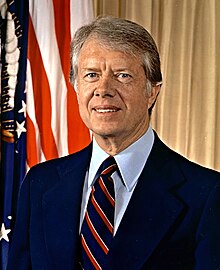📖 Presidential Profile
Comprehensive overview of leadership, policies, and historical significance
📋 Biography & Political Journey
Early Life and Naval Career
James Earl Carter Jr. was born on October 1, 1924, in Plains, Georgia, to a peanut farming family. He graduated from the U.S. Naval Academy in 1946 and served in the Navy’s submarine program, including work on the nuclear submarine program under Admiral Hyman Rickover. After his father’s death in 1953, Carter returned to Georgia to take over the family peanut business, which he successfully expanded. He also became active in local politics and civil rights issues, serving on the Sumter County Board of Education and opposing racial segregation.
Governor of Georgia and Presidential Campaign
Carter served as Governor of Georgia from 1971 to 1975, where he promoted government efficiency and racial equality, declaring in his inaugural address that “the time for racial discrimination is over.” He launched his presidential campaign as a complete outsider, capitalizing on post-Watergate distrust of Washington politicians. Running on a platform of honesty and moral leadership with the slogan “I will never lie to you,” Carter defeated incumbent Gerald Ford in 1976, becoming the first president from the Deep South since the Civil War.
Domestic Policy and Energy Crisis
Carter’s presidency was marked by significant domestic challenges, including high inflation, unemployment, and energy shortages. He established the Department of Energy and the Department of Education, and implemented comprehensive civil service reform. Carter promoted energy conservation, installing solar panels on the White House roof and urging Americans to lower their thermostats. He also championed human rights both domestically and internationally, though his moralistic approach sometimes complicated foreign policy relationships with authoritarian allies.
Foreign Policy Crises and Challenges
Carter’s presidency was severely damaged by several foreign policy crises, most notably the Iran hostage crisis, where 52 Americans were held captive for 444 days after Iranian revolutionaries seized the U.S. embassy in Tehran. A failed rescue mission in 1980 further undermined his presidency. Carter also faced criticism for his response to the Soviet invasion of Afghanistan in 1979, though he did implement significant aid to Afghan resistance fighters. His perceived weakness in foreign affairs became a major issue in his 1980 re-election campaign against Ronald Reagan.
Malaise Speech and Memorable Moments
Carter’s presidency is often remembered for his “Crisis of Confidence” speech in 1979, popularly known as the “malaise speech,” though he never used that word. In it, he spoke of a national spiritual crisis, saying Americans were experiencing “a crisis that strikes at the very heart and soul and spirit of our national will.” Carter was also famous for carrying his own luggage, staying in ordinary people’s homes during campaigns, and once being attacked by a swimming rabbit during a fishing trip in 1979, an incident that became symbolic of his perceived ineffectiveness. His post-presidency humanitarian work, including building homes with Habitat for Humanity well into his 90s, has significantly rehabilitated his historical reputation.
Humor & Jokes
Plains Georgia
Jimmy Carter put Plains, Georgia on the map. Population: 600 people and one former president.…
Read More →Greatest Wins
🤝 Panama Canal Treaties: Peaceful Transfer of Sovereignty
Carter's Panama Canal Treaties demonstrated American commitment to international law and peaceful resolution, ending decades…
Read More →Epic Fails
📺 The 'Malaise' Speech and Crisis of Confidence
Carter's infamous speech blaming Americans for a 'crisis of confidence' backfired spectacularly, appearing to shift…
Read More →